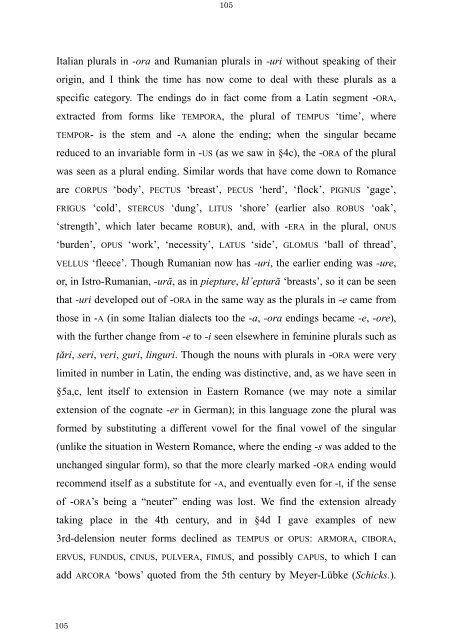The Latin Neuter Plurals in Romance - Page ON
The Latin Neuter Plurals in Romance - Page ON
The Latin Neuter Plurals in Romance - Page ON
Create successful ePaper yourself
Turn your PDF publications into a flip-book with our unique Google optimized e-Paper software.
105<br />
105<br />
Italian plurals <strong>in</strong> -ora and Rumanian plurals <strong>in</strong> -uri without speak<strong>in</strong>g of their<br />
orig<strong>in</strong>, and I th<strong>in</strong>k the time has now come to deal with these plurals as a<br />
specific category. <strong>The</strong> end<strong>in</strong>gs do <strong>in</strong> fact come from a <strong>Lat<strong>in</strong></strong> segment -ORA,<br />
extracted from forms like TEMPORA, the plural of TEMPUS ‘time’, where<br />
TEMPOR- is the stem and -A alone the end<strong>in</strong>g; when the s<strong>in</strong>gular became<br />
reduced to an <strong>in</strong>variable form <strong>in</strong> -US (as we saw <strong>in</strong> §4c), the -ORA of the plural<br />
was seen as a plural end<strong>in</strong>g. Similar words that have come down to <strong>Romance</strong><br />
are CORPUS ‘body’, PECTUS ‘breast’, PECUS ‘herd’, ‘flock’, PIGNUS ‘gage’,<br />
FRIGUS ‘cold’, STERCUS ‘dung’, LITUS ‘shore’ (earlier also ROBUS ‘oak’,<br />
‘strength’, which later became ROBUR), and, with -ERA <strong>in</strong> the plural, <strong>ON</strong>US<br />
‘burden’, OPUS ‘work’, ‘necessity’, LATUS ‘side’, GLOMUS ‘ball of thread’,<br />
VELLUS ‘fleece’. Though Rumanian now has -uri, the earlier end<strong>in</strong>g was -ure,<br />
or, <strong>in</strong> Istro-Rumanian, -ură, as <strong>in</strong> piepture, kl’eptură ‘breasts’, so it can be seen<br />
that -uri developed out of -ORA <strong>in</strong> the same way as the plurals <strong>in</strong> -e came from<br />
those <strong>in</strong> -A (<strong>in</strong> some Italian dialects too the -a, -ora end<strong>in</strong>gs became -e, -ore),<br />
with the further change from -e to -i seen elsewhere <strong>in</strong> fem<strong>in</strong><strong>in</strong>e plurals such as<br />
Ńări, seri, veri, guri, l<strong>in</strong>guri. Though the nouns with plurals <strong>in</strong> -ORA were very<br />
limited <strong>in</strong> number <strong>in</strong> <strong>Lat<strong>in</strong></strong>, the end<strong>in</strong>g was dist<strong>in</strong>ctive, and, as we have seen <strong>in</strong><br />
§5a,c, lent itself to extension <strong>in</strong> Eastern <strong>Romance</strong> (we may note a similar<br />
extension of the cognate -er <strong>in</strong> German); <strong>in</strong> this language zone the plural was<br />
formed by substitut<strong>in</strong>g a different vowel for the f<strong>in</strong>al vowel of the s<strong>in</strong>gular<br />
(unlike the situation <strong>in</strong> Western <strong>Romance</strong>, where the end<strong>in</strong>g -s was added to the<br />
unchanged s<strong>in</strong>gular form), so that the more clearly marked -ORA end<strong>in</strong>g would<br />
recommend itself as a substitute for -A, and eventually even for -I, if the sense<br />
of -ORA’s be<strong>in</strong>g a “neuter” end<strong>in</strong>g was lost. We f<strong>in</strong>d the extension already<br />
tak<strong>in</strong>g place <strong>in</strong> the 4th century, and <strong>in</strong> §4d I gave examples of new<br />
3rd-delension neuter forms decl<strong>in</strong>ed as TEMPUS or OPUS: ARMORA, CIBORA,<br />
ERVUS, FUNDUS, CINUS, PULVERA, FIMUS, and possibly CAPUS, to which I can<br />
add ARCORA ‘bows’ quoted from the 5th century by Meyer-Lübke (Schicks.).









